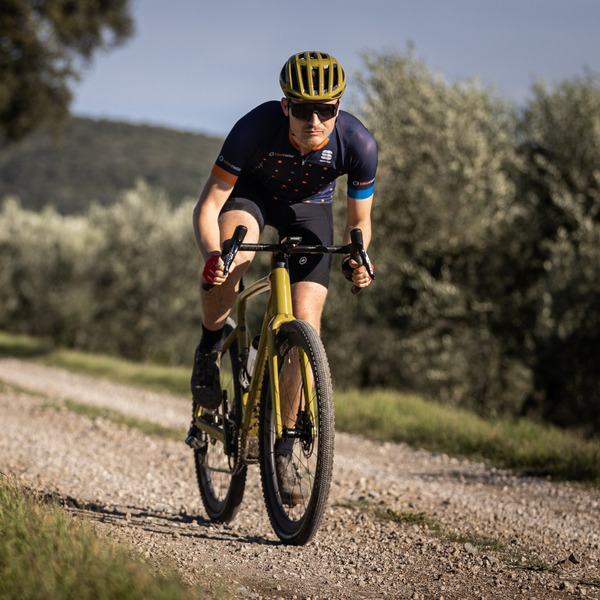GX Eagle AXS Transmission is the most affordable entry into SRAM’s direct-mount ecosystem.
Although ostensibly a mountain bike groupset, GX AXS Transmission is becoming increasingly popular on gravel, where it can be used as part of a mullet drivetrain.
Senior technical editor Alex Evans has penned a comprehensive review, testing the groupset in its natural mountain bike habitat over 16 months.
But I’ve also ridden it for 2,300km on gravel aboard the excellent 3T Extrema Italia. The groupset was called into battle for Badlands, widely considered to be one of Europe’s most savage ultra-endurance races, as well as an autumnal bikepacking trip in dismal conditions.
In short, SRAM GX AXS Transmission is not just a fantastic gravel option, but also the more logical choice over an equivalent gravel groupset for many riders.
The most generous range

GX AXS Transmission’s major appeal versus other SRAM gravel groupsets is its very generous 520 per cent range. The cassette is only offered in a 10-52t ratio – the direct-mount rear derailleur forgoes limit screws and B-gap to optimise shifting quality, which means the groupset can only work with one cassette.
This range betters Shimano GRX RX820 Unstoppable (10-51t) and Campagnolo Ekar GT (10-48t).
You can never have a low enough range, especially when bikepacking where your bike is laden with bags.
The 52t saw near-constant use during Badlands, getting up the ferocious Spanish gradients.

Earlier this year, SRAM Red XPLR AXS was announced – a gravel groupset with a direct-mount rear derailleur inspired by Transmission. This groupset is only available with a 10-46t cassette.
That range could leave you wanting for day-to-day riding if you live in mountainous terrain, let alone for bikepacking trips.
If you want to have a more generous range and stick with SRAM, Transmission is the only option and would involve switching out the rear derailleur, chain and cassette – a costly proposition, which you could have avoided by opting for a Transmission family groupset in the first place.
Yes, Red XPLR AXS may be 13-speed and may shift that little bit faster, but I’d far rather have the correct range in the first place over an extra gear.
Of course, your other option is to go for a 2x groupset, but I’m all for doing without a pesky front derailleur for off-road riding.
Fantastic shifting under load

SRAM’s Transmission drivetrains perform impressively when shifting under load.
The rear derailleur is programmed to shift on specific parts of the cassette. SRAM calls this 'cassette mapping'.
As a result, shifts are a little slower when you’re not pedalling hard (although Alex disagrees). If you’ve ridden SRAM’s other AXS grouspets, the difference is noticeable.
But I will concur with Alex in that Transmission’s shifting is consistently smooth and always unflustered, regardless of weather or trail conditions.
The groupset I’ve tested was fully submerged in standing water on many occasions during an autumnal bikepacking trip, and it got caked in mud and filth every day. It hasn’t missed a beat.
No hanger to worry about

An unexpected benefit of the direct-mount rear derailleur is travelling with your bike. There’s no derailleur hanger to worry about bending or breaking.
I always sigh when I have to remove the hanger and rear derailleur when travelling, before I carefully wrap them in bubble wrap and find a spot at the bottom of the box where they can’t be hit by something else.
SRAM Transmission gets rid of that problem and I felt very smug knowing I would be arriving at my destination with minimal reassembly and not having to check or adjust the rear derailleur indexing.
That also translates to when you’re packing your bike into a car and when riding. Although I still position the bike so the rear derailleur isn’t leaning against something (I’m a creature of habit), I like not having to worry about a derailleur hanger bending.
Remember that Wide crankset

The 3T Extrema Italia I tested this groupset on came with a SRAM Rival non-power-meter crankset, but I wanted access to power – among other upgrades – for Badlands. I also wanted to save some weight, so opted to step up to Force in the process.
What I foolishly didn’t know was you must use a crankset with a DUB Wide spindle when paired with Tranmission.
I discovered this when the power meter crankset had arrived and I removed the Rival one, and noticed the axle said ‘Wide’ on it. The penny quickly dropped…
This is because Tranmission drivetrains rely on a 55mm chainline, and because the DUB Wide spindle is 47.5mm (up from the 45mm of a typical DUB spindle), you’ll also need to use some spacers to achieve this.
I’m very grateful I was able to get a replacement crankset in time before flying off to Spain.
Would I opt for SRAM Transmission on my own bike?

I’ve been hugely impressed by SRAM Tranmission – I’d go as far as to say it’s the best product release from SRAM in years.
I love the precise and consistent shifting, the fact it’ll withstand any abuse you can throw at it and its sensible gear ratios.
There is one drawback – as I’ve said ad nauseum in many of my reviews, I don’t get on with the lever design found on Apex, Rival and Force AXS.

The workaround could be to use SRAM’s Red AXS levers, which are a completely different shape.
I haven’t tried these yet, but providing I get on with them, that would be the way to go, at least for my judgemental mitts.

Otherwise, I’d probably opt for Campagnolo Ekar GT – although gear cables are becoming seen as increasingly archaic, the levers are luxuriously comfortable.
But with more and more frames being designed around electronic groupsets, SRAM Transmission would undoubtedly be my pick if I were put in that predicament.
Provided the lever ergonomics are agreeable for you, SRAM Transmission is a no-brainer for gravel riding.
